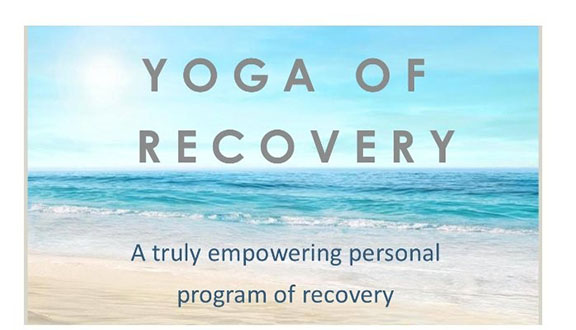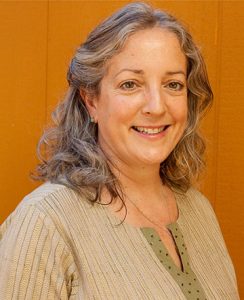
Durga Leela is a clinical Ayurveda and Pancha Karma specialist who has been involved with 12-step programs for the past 13 years. She developed the Yoga of Recovery to help those struggling with addictions lead new, empowered lives. In this interview, she discusses how Yoga’s sister science, Ayurveda, can be used to develop our potential.
Integral Yoga Magazine (IYM): How did you decide to work with the 12-step program, Yoga and Ayurveda?
Durga Leela (DL): I found that many of us utilizing the 12-step program maintained sobriety for considerable lengths of time from our initial drug of choice, but had shifted into dependence on some other substance (often food) or behavior (often codependence) in recovery. If the 12-step solution was spiritual, allowing us to recover from a “seemingly hopeless condition of mind and body,” then why did the addiction simply shift into another area, even for those who genuinely worked the program? What in our nature compels us to this continual external seeking? How spiritual did we need to be in our daily lives to fully recover from all dependencies and addictions
People with addictions tend to have a desire to transcend the mundane—to find a truth that is eternal. We all may have met imposters that seemed to give us power, but in Yoga we’re looking for the true power of our spiritual source. So, when people are introduced to the Yogic psychology of how to deal with the mind, the Yogic philosophy of the Self and the practice an Ayurvedic lifestyle, and make use of these alongside the principles of the 12 steps, they then have a truly empowering personal program of recovery.
IYM: How do the sister-sciences, Yoga and Ayurveda, work together to help people recover from addictions?
DL: Ayurveda is the original Yoga therapy; it’s a full medical science. In Yoga of Recovery, we use Yoga and Ayurveda to find ways to live that are more balanced, more conducive to finding what we’re all looking for. We all want tools to experience more peace in our lives. We look at the stress response of the different doshic types, unmanaged emotions, how the mind works by repetition, creating deep grooves of self-destructive habits. All of us need to be supported in health throughout our lives so we can embark on the journey and the rigors of the spiritual path. While many people struggling with addiction may not know a lot about Yoga or Ayurveda, they often see their problems as a spiritual malady. They’re looking for wellness that has a spiritual basis. People in recovery are often delighted that Yoga has a sister science that offers a lifestyle and routine rooted in spirituality.
IYM: How does Yoga therapy treat addiction, as contrasted from Western psychology?
DL: Our culture is confused about addiction on all levels, and it’s important to recognize ways in which Yoga and Ayurveda balance the current medical system. Allopathic physicians are excellent for diagnosing and treating many illnesses, but due to the constraints of short visits, and the intense but specialized training, they’re often unable to meet the complex, socio-emotional, psychological and physical needs of someone with addiction problems. Additionally, because the medicine they prescribe is pharmaceutical, it may play into an addict’s desire to self-medicate away his or her sorrows
IYM: How are addictions viewed from a yogic/Ayurvedic perspective?
DL: The Ayurvedic doctor, Robert Svoboda, talks about “inflated ahamkara energy . . . a disease of the ahamkara,” the ego, needing to feel inflated individuality. Addictions are rooted in the ego. In this world there are threats, people feel fear, anxiety and instability—so it’s understandable that they’d want to feel stronger, more stable or more powerful. We attach ourselves to that which gives us a sense of power: work, relationships, alcohol, sex, drugs or eating disorders. While our addictions may work in the short term, they’re destructive in the long term. Eventually addictions destroy our relationship to health, to self, society and spirituality.
Addictions are tamasic, or heavy. The tamasic nature of addictions cuts people off from all of their intense emotions and fears. What is created in tamas is a shell of protection. We need to also understand that tamasic states are rooted in rajas, or passion, action and intensity. I describe rajas as “light on, light off.” That is, you have awareness, then you forget and then you remember again. In America, the way we live exacerbates rajas because our society is hyper-speed along with hyper-stimulation. We’re always asked to do more and more. It’s like living with a flickering strobe light. It feels so painful to live like this and many people just crave to turn it off. They voluntarily turn to tamas, to their addictions, to allay the suffering. Individuals may choose stagnation/inertia because that enables them to numb their unbearable feelings of vulnerability, lack of safety or self-rejection.
People in our society have a lot of low-level addictive behavior that goes unnoticed: food issues, relationship challenges, excessive television watching, compulsive shopping. This provides a clue to the universal root of all addictions—the fact that we have externalized an inner spiritual need; an easy path to take in our society of over-consumption and hyper-sensory stimulation. In this 21st century, we can consider the view of the addict as a seeker, someone who is inherently trying to transcend the mundane. In Overcoming Addictions, Dr. Deepak Chopra describes the problem as, “Self-destructive outlets for an unrecognized spiritual craving.” So, we need to get to the root cause of addictions.
IYM: What else can we learn from how Ayurveda views addiction?
DL: We first need to understand that people dealing with addiction issues are in biochemical disrepair. Ayurveda views the biochemical disrepair in a different way from Western psychology and medicine. The focus of Ayurveda is on digestion and because 80 percent of the serotonin we produce is in the gut, this also makes sense through the lens of neuroscience. When we look at the brain in isolation, apart from the other systems of the body, we’re not seeing the full picture; we can’t see the importance of digestion. From an Ayurvedic perspective you will not repair the chemicals in your brain until your repair the chemicals in your gut. There may be a disordered brain, but it’s because the entire system isn’t working right. We have to look at how the systems function together.
IYM: Is a vegetarian diet important for people on the path to recovery?
DL: In yogic theory, meat is tamasic, and our definition of addiction is a state of tamas, brought on by excessive rajas. When we point out that meat brings on a mindset that is not ideal if you are struggling with addictions, many people begin to take a closer look at their diets. People don’t want to aggravate their existing condition and will usually chose other options, if they know it will help them to alleviate suffering. In Yoga of Recovery we talk about the advance toward sattva, the cultivation of peace, contentment and nonviolence. I try not to give ultimatums, which are a form of violence. Additionally, I don’t like to be prescriptive when it comes to food, especially, because food and people are among our foundational attachments. People act out through these attachments and obsessions with food and love relationships on a daily basis. And these are not illegal!
Instead of preaching about vegetarianism, we tend to talk about the digestibility of our food. After we describe digestion, we talk about the times of the day when the doshas (vata, pitta and kapha) are most active and how people can feel their effects. We discuss hypoglycemia, which is prevalent in individuals who have experienced alcoholism. I ask people to be aware of how they feel when they digest their food. Then we discuss the gunas (sattva, rajas and tamas) and how these are related to the food we eat. One’s metabolism can really get off kilter due to addictions, particularly with alcoholism, eating disorders and drug abuse. As we enter into recovery, we need to pay close to attention to what does and does not work for us. I try to put the focus on the individual’s capacity to “take in” this world.
IYM: Do you see Western psychology as beginning to embrace some of the ideas from Yoga and Ayurveda?
DL: Psychologists are beginning to understand that we need movement because moving the body help us to release psychological tension. We can’t just sit and talk the problems away. I was at a trauma conference for veterans recently, and some of the speakers came to the conclusion that Yoga, Tai Chi and nutrition are all critical for people’s wellbeing and these will take place in the community. Ayurveda has always been a social medicine—it is a form of social caring.
The other thing Ayurveda brings to our understanding of healing, is that it treats the individual rather than the disease. The descriptions of health and wellness from Yoga and Ayurveda point, not only to what ails us, but to our potential. We are not statistics or norms, but individuals. Often people live up to their labels. And the mental health field can describe illness in such a convincing way that it seems like there’s no way out. Addictions are serious illnesses with biological, social, spiritual, emotional, economic and political consequences. I don’t want to deny the serious nature of these illnesses, but what Yoga and Ayurveda offer for those who are in recovery is empowerment; the empowerment to start making changes and to live life differently. Neither discipline is a passive form of medicine. Both Yoga and Ayurveda are an engaged form of social action and education. As a form of educational empowerment, Ayurveda helps individuals to understand the human condition.
About Durga Leela:
 Durga Leela is a clinical Ayurveda and Pancha Karma specialist, trained in the US and India and has served as the Director of the Ayurveda Programs at the Yoga Farm in California since 2003. She is a speaker for the National Ayurvedic Medical Association (NAMA) and a member of Yoga Alliance and the International Association of Yoga Therapists (IAYT). She has been a grateful member of 12-step fellowship for over 13 years. For more information about Durga Leela and her programs go to: www.yogaofrecovery.com.
Durga Leela is a clinical Ayurveda and Pancha Karma specialist, trained in the US and India and has served as the Director of the Ayurveda Programs at the Yoga Farm in California since 2003. She is a speaker for the National Ayurvedic Medical Association (NAMA) and a member of Yoga Alliance and the International Association of Yoga Therapists (IAYT). She has been a grateful member of 12-step fellowship for over 13 years. For more information about Durga Leela and her programs go to: www.yogaofrecovery.com.

